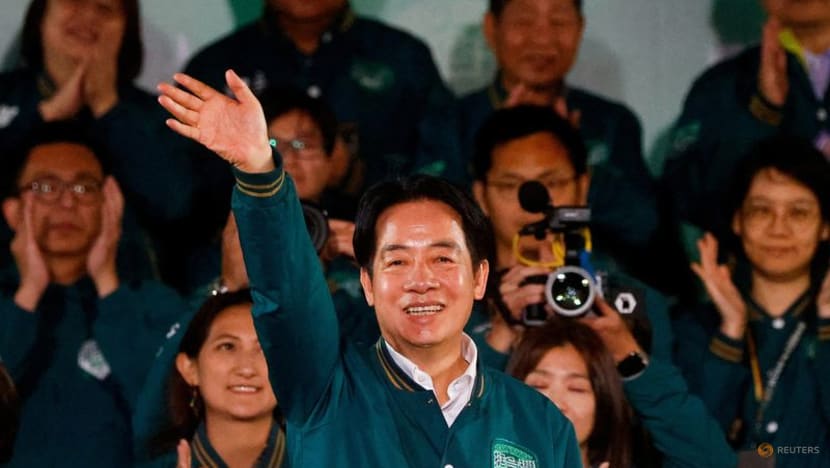China rebukes countries, summons Philippine envoy in wake of Taiwan elections

Taiwan President-elect Lai Ching-te, of Democratic Progressive Party's (DPP) gestures as he attends a rally following the victory in the presidential elections, in Taipei, Taiwan, on Jan 13, 2024. (Photo: Reuters/Ann Wang)

This audio is generated by an AI tool.
BEIJING: China summoned the ambassador of the Philippines on Tuesday (Jan 16) after President Ferdinand Marcos Jr congratulated Taiwan's president-elect Lai Ching-te on his election victory.
The move came after Beijing rebuked countries that congratulated Lai on his victory, including the United States, Japan, Singapore and several European nations.
"This morning, Assistant Minister Nong Rong summoned the ambassador of the Philippines to China to make solemn representations and urge the Philippine side to give the Chinese side a responsible explanation," foreign ministry spokeswoman Mao Ning told a regular press conference.
"The Chinese side is strongly dissatisfied and resolutely opposes" Marcos's remarks, Mao said.
Independence-leaning Lai eased to a comfortable victory in Taiwan's presidential election on Saturday.
China regards the democratic island as part of its territory and has vowed to seize it, by force if necessary.
Beijing does not maintain diplomatic ties with countries that recognise Taiwan and opposes official communications with Taipei by foreign powers.
"Anyone in the international community who violates the One China principle is interfering in China’s internal affairs and infringing upon China’s sovereignty, and will face the joint opposition of the Chinese people and the international community," said Mao.
"China deplores and strongly opposes relevant countries’ wrong practices violating the One China principle, including issuing statements and ‘expressing congratulations’. We’ve lodged serious demarches."
A demarche is a diplomatic statement.
In a social media post on Monday, Marcos congratulated Lai on his election and said he looked forward to "close collaboration" with him.
The remarks "are a serious violation of the One China Principle ... a serious breach of the political commitments made by the Philippines to the Chinese side, and a gross interference in China's internal affairs", Mao said.
"We are telling the Philippine side not to play with fire on the Taiwan issue ... and to stop immediately its wrongful words and deeds on Taiwan-related issues and sending wrong signals to separatist forces for Taiwan independence," she added.
"We advise President Marcos to read more to properly understand the history of the Taiwan issue so that he can draw the right conclusions."
The Philippines' foreign ministry in a statement earlier on Tuesday reaffirmed the country's "One China policy" and said the message of Marcos intended to recognise the Philippines and Taiwan's "mutual interests", including 200,000 overseas Filipino workers (OFWs) in the democratically governed island.
It said the message "was his way of thanking them for hosting our OFWs and holding a successful democratic process. Nevertheless, the Philippines reaffirms its One China Policy.
Beijing's fury over the remarks is the latest in a succession of clashes between the Philippines and China, which come as Manila bolsters ties with former colonial ruler the United States, including expanding an agreement on Washington's use of its military bases.
Other leaders have also congratulated Lai on his victory, with many, including US Secretary of State Antony Blinken and Japanese Foreign Minister Yoko Kamikawa, calling for peaceful resolution of tensions in the Taiwan Strait.
On Sunday, in its response to media queries, Singapore's Ministry of Foreign Affairs (MFA) said that "we welcome the successful conclusion of the elections and congratulate Dr William Lai and his party on their victory".
A day later, China's foreign ministry spokeswoman Mao said in a press conference that China "immediately made solemn demarches to Singapore" over the statement.
"Singaporean leaders stated on multiple occasions that the Taiwan question is 'a deep red line' for China," she said. "China values this statement and hopes that Singapore will strictly abide by the One China principle and uphold the overall friendly relations between China and Singapore with concrete actions."
Separately, Taiwan's foreign ministry expressed its thanks to Marcos, saying Taiwan and the Philippines "share values such as freedom, democracy and the rule of law" and Taiwan would further deepen cooperation and exchanges."
The Philippines has unofficial ties with Taipei, with its Manila Economic and Cultural Office in Taiwan serving as a de facto embassy.














